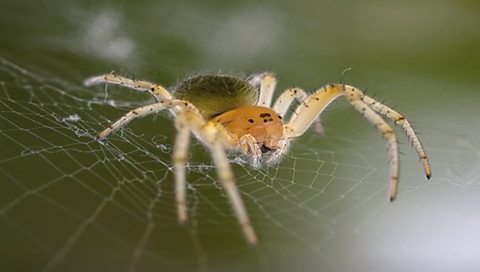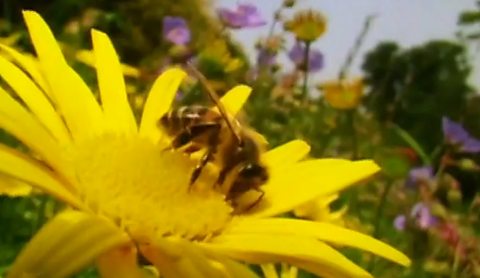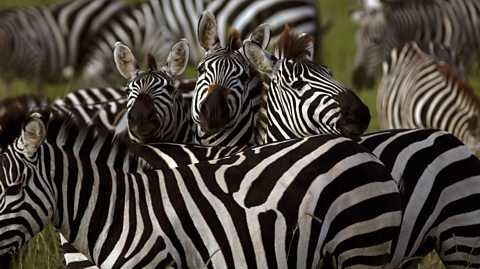µţ±đ±đłŮ±ô±đ˛ő…
A scorpion…
A centipede…
A spider…
And a caterpillar…
These are just a few of the thousands and thousands of different types of creatures we call "minibeasts".
Minibeasts are animals without a backbone.
This makes them soft and bendy.
And because of this, some of them have to have hard shells to live in.
Some minibeasts, like these leaf insects, are great at disguising themselves as a dead leaf, or a damaged leaf, or a green leaf.
Perfect for keeping themselves safe.
This bombardier beetle has got a real hot trick up its sleeve.
If something tries to grab it, it squirts a boiling liquid from its body.
These pictures are slowed down, so you can see what happens.
This beetle avoids being eaten by squirting a disgusting liquid from its nose.
Errr! Horrible!
Lots of insects fly, like this dung beetle.
They keep their wings underneath their hard shells on their backs.
This one's flying and homing in on some smelly dung.
Now he's rolling it away to eat later.
These minibeasts are ants… leaf-cutter ants.
And look how strong these army ants are, they can carry stuff that weighs much more than they do.
These ants are talking to each other using touch and smell.
There are minibeasts everywhere we go.
Next time you're outside, see if you can see some minibeasts.
Video summary
Learn about the characteristics of minibeasts. We meet lots of different animals without a backbone, also known as invertebrates.
Some minibeasts use camouflage, and some have different defences to avoid being eaten.
Minibeasts have different ways of gathering food.
Dung beetles fly until they find animal dung, and leaf cutter ants can carry food which is heavier than they are.
This short film comes from the 91Čȱ¬ series, Our Planet.
Teacher Notes
- Children could make their own large-scale minibeast through junk modelling and then use them to write descriptions about their characteristics.
- After watching the clip the children could act out the actions of the minibeasts and the class could guess which minibeast they are.
- As the clip covers the idea of camouflage, the children could try and camouflage themselves in different areas around school.
- After the clip shows the bombardier beetle’s defence mechanism, children could be asked to think about their own defence mechanisms.
This short film is relevant for teaching Science at KS1 in England and Wales, Foundation and KS1 in Northern Ireland and Early level and first level in Scotland.
Characteristics of minibeasts. video
A brief audio slideshow that shows what the features of minibeasts are and explains why they are so magnificent.

Characteristics of insects. video
What is an insect? A look at the characteristics of an insect, including their legs, wings and their lifestyles.

Animals. collection
A collection of KS1 science clips about animal classification. Watch simple introductions to fish, amphibians, marine life, egg-laying animals, spiders, animals with patterns and nocturnal wildlife.
